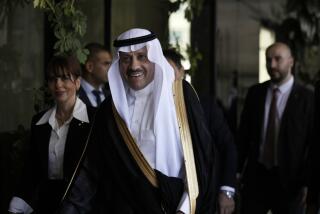U.S. Cites Saudi Arabia for Lack of Religious Freedom
- Share via
WASHINGTON — The United States bowed to domestic pressure Wednesday and for the first time named Saudi Arabia, a key ally, as one of the world’s worst violators of religious freedom.
The Middle Eastern kingdom was listed as “a country of particular concern” in the State Department’s Annual Report on International Religious Freedom 2004. By law, that listing requires the Bush administration to consider possible action against Saudi Arabia, including sanctions, though there was no immediate indication that the U.S. was prepared to take such a step.
“Freedom of religion does not exist,” the report states. “It is not recognized or protected under the country’s laws and basic religious freedoms are denied to all but those who adhere to the state-sanctioned version of Sunni Islam.”
Saudi Arabia joined Vietnam and Eritrea as newcomers to a list of those considered egregious offenders that already included Myanmar (formerly Burma), China, Cuba, Sudan, Iran and North Korea.
Wednesday’s actions, which reportedly came after months of agonizing within the State Department, mark the first time a close ally of the United States has been included in the category.
The United States has long viewed Saudi Arabia as a dependable Arab friend in the restive Middle East. The kingdom is also the world’s largest single supplier of oil and has worked to counter the rise in energy prices to record levels.
Those factors have contributed to the United States’ reluctance to confront the kingdom on its human rights record, critics have complained.
Rep. Tom Lantos (D-San Mateo), the ranking Democrat on the House International Relations Committee and co-chairman of the Congressional Human Rights Caucus, said the listing reflected what he called “a sea change” in the public perception of Saudi Arabia that has occurred in the United States since the Sept. 11attacks.
He noted that a majority of the airplane hijackers involved in the attacks were Saudi and that it was Saudi money that funded many fundamentalist religious schools in the Middle East that preached a syllabus anchored in hatred of the United States.
“For years there was an unspoken attitude that ... friends like the British, the French and the Germans could be criticized, but Saudi Arabia was beyond criticism,” he said. “This is just a straw in the wind that Saudi Arabia will be treated just like any other country.”
The Saudi issue also has echoes in the U.S. presidential campaign, with some critics of President Bush claiming that the Bush family is too close to the Saudi leadership. That claim is also a theme of Michael Moore’s documentary “Fahrenheit 9/11,” which is highly critical of Bush.
Democratic challenger Sen. John F. Kerry of Massachusetts has pledged to take a tough stance against the Saudis on issues including international money laundering and the tracking of terrorist funds if he becomes president.
In a speech in Detroit on Wednesday detailing what he called Bush’s “wrong choices” on the economy, Kerry said the president had chosen “special friendships with the Saudis instead of an independent energy policy for America.”
In a prepared statement, Kerry campaign advisor Susan Rice said: “The State Department’s religious freedom report finally recognizes serious problems of religious repression in Saudi Arabia, and we support the designation of Saudi Arabia as ‘a country of particular concern.’
“Sadly, when it comes to Saudi Arabia, George Bush continues to take a kid glove approach. President Bush’s record makes clear: The only time he will acknowledge unacceptable Saudi behavior is within weeks of an election.”
There was no immediate reaction from Riyadh, the Saudi capital, to the development, and an official at the Saudi Arabian Information Office, an arm of the Saudi Embassy in Washington, declined to comment.
The Saudi government officially allows only the strict Wahhabi school of Islam, restricting the practice of other branches of Islam as well as other religions.
At a news conference Wednesday, John Hanford, U.S. ambassador-at-large for international religious freedom, focused on the persecution of other Muslims.
“Non-Wahhabi Sunni Muslims as well as Shias and Sufi Muslims face discrimination and sometimes severe restrictions on the practice of their faith,” Hanford said.
“A number of leaders from these traditions have been arrested and imprisoned.”
The report was welcomed by human rights groups, some members of Congress and conservative Christian organizations, who have repeatedly argued that Saudi Arabia had long violated the accepted norms of religious freedom but had escaped being cited because of its role as the world’s biggest oil exporter and an important U.S. ally in a volatile region.
They maintained that the repeated failure to cite Saudi Arabia was so conspicuous that it weakened the report’s credibility. The report Wednesday was the U.S. government’s sixth such compilation.
“The lack of religious freedom in Saudi Arabia is no secret and their omission has been a glaring weakness of the report,” said Sarah Leah Whitson, executive director of the Middle East and North Africa Division at Human Rights Watch in New York.
The U.S. Commission on International Religious Freedom, an independent federal panel established by the same 1998 legislation that triggered the annual State Department international religious freedom reports, also applauded the move.
“The commission has been recommending that Saudi Arabia be designated a CPC since the commission was formed,” Chairperson Preeta D. Bansal said in a written statement released late Wednesday.
More to Read
Sign up for Essential California
The most important California stories and recommendations in your inbox every morning.
You may occasionally receive promotional content from the Los Angeles Times.













